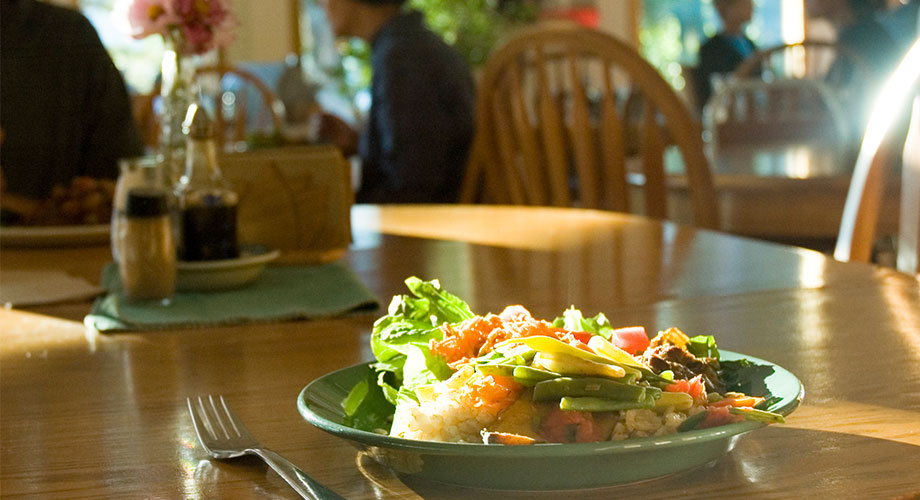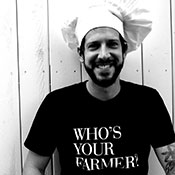
A Chef’s Perspective on the Ashram’s Food Production
Okanagan-based chef Giulio Piccioli of One Big Table recently visited the Ashram for a Karma Yoga stay. He shares his perspective on our full cycle approach to food production.
When I first showed up at Yasodhara Ashram, I knew very little about it, having purposefully avoided finding out more to avoid expectations.
From a friend I knew I would find divinities adorning its walls. I had also heard that the food was excellent. But to be honest I wasn’t really looking for teachings or food—being a chef gives me good food everyday. Rather, I was seeking that special quiet that only a monastery can offer so I could reflect on what was happening in my life.
I remember thinking, “I am only here for a week, how much can really happen in such a short period of time?”
Lots did happen in that beautiful way it often does when I am paying attention. And everything you do at the Ashram, at least for me, was aimed at paying attention—a simple practice that holds such a transformative power.
It’s hard to point to one specific event that encouraged mindfulness simply because everything seemed to be so connected. Within my Karma Yoga practice (work as service), my actions and my stumbling points were intimately tied to both my habits and to a greater consciousness. I found teachings everywhere I looked. But it is when I walked into the kitchen—somewhat reluctantly since I wanted a break from my workplace—that my eyes really started to focus.
I have seen many kitchens. I have explored my personal relationship with food and the power food has to shape our reality and to build community. I have come to see the dining table as an opportunity to practice values that I believe are necessary to build a better world. But I also often questioned what my role is in all of this, and the effect that my little self has in facilitating change. Does it really make a difference what I choose if most of the world chooses differently? By the time I left the Ashram, I had a much more definite answer to that question.
Inspiration seeped from every corner of the Ashram grounds. I first stumbled upon one of the root cellars, while putting tools away, and I was blown away by its colourful intricacy and beauty. Then, it was a conversation with Steve Kruse, the chef. I was inspired by his knowledge of the flavours from the local area and of its farmers, and the role the Ashram plays as it chooses organic practices, small farms, seasonal ingredients.
Sustainability, investing locally, re-using, recycling, conserving and evolving are not just words but choices that are being made in every single action. What it took to bring each meal in front of you is clear, and understanding the role it plays in your life is evident: it has a FLOW.
The truth is that so much of what we think we can do for our health, for our mental wellbeing, and for the planet is not just thought about, but practiced at the Ashram day after day.
I wondered how much of what I had experienced at the Ashram I could realistically apply to my everyday life. There was definitely a significant gap but also a huge opportunity to improve on my own choices through the many examples offered.
My final reflection was about people. Time is a key ingredient in sustainable practices. A huge amount of people power is required to process and harness the bounty of the summer gardens and orchards. And people are, without a doubt, a unique strength of the Ashram. But it is not just about quantity; it is about quality. A distinct intention goes into every action, however simple, that shapes the final product and gives it life. The whole operation then becomes alive and behaves like its own organism, able to shift and adjust according to the energy available, the task at hand, and the ability and dedication, that will vary greatly, of the individuals involved.
It was beautiful to observe and join in.
The simplest and most powerful lesson I learned is that a better planet already exists, and it is driven by us—by people of all walks of life, ages and backgrounds.
About Giulio Piccioli
 Being born and raised in Italy has had, of course, a profound impact on my life and on how I relate to food. At the age of 19, I left home and I moved to Ontario. The opportunity to learn and really understand how people eat in a different country really surprised and inspired me, so I decided to make a career out of what had been a simple passion. I had the opportunity to work with some amazing chefs both in Italy and Canada and food became my way to speak and relate with people.
Being born and raised in Italy has had, of course, a profound impact on my life and on how I relate to food. At the age of 19, I left home and I moved to Ontario. The opportunity to learn and really understand how people eat in a different country really surprised and inspired me, so I decided to make a career out of what had been a simple passion. I had the opportunity to work with some amazing chefs both in Italy and Canada and food became my way to speak and relate with people.
“Sustainability, investing locally, re-using, recycling, conserving and evolving are not just words but choices that are being made in every single action…The truth is that so much of what we think we can do for our health, for our mental wellbeing, and for the planet is not just thought about, but practiced at the Ashram day after day.”


Great insight in weaving together mindful living in food, spirit and appreciation of community that nourishes. Thank you
Very inspiring Guilio. Your words make the Ashram come alive. Thank you,